- europages
- >
- COMPANIES - SUPPLIERS - SERVICE PROVIDERS
- >
- limes
Results for
Limes - Import export
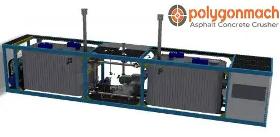
POLYGONMACH MAKINE SANAYI VE TICARET LTD STI
Turkey
A polymer modified bitumen plant is a special facility and part of the process—an essential one—in producing polymer-modified bitumen that will later be used in creating more robust asphalts for many construction applications. This process involves the addition of specific polymer additives into the bitumen for the attainment of superior performance characteristics in terms of improved durability, flexibility, and resistance to deformation. PMB is used in the construction of roads and other critical infrastructure such as airport runways, where the pavement undergoes heavy traffic, adverse weather conditions, or any other punishing environment. A Polymer Modified Bitumen Plant produces bitumen that will be stalwart enough to meet the requirements of the new, more demanding infrastructure projects. The addition of polymers to bitumen will allow the plant to come up with a product that is resistant not only to traffic pressure in high-traffic areas but also to structure wear over time.
Request for a quote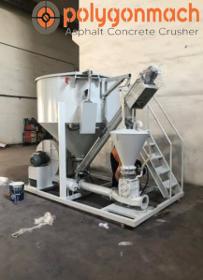
POLYGONMACH MAKINE SANAYI VE TICARET LTD STI
Turkey
The Asphalt Fiber Granule Additive System is a modern, pre-engineered component assembled in asphalt plants for the introduction of fiber granules into asphalt mix with needed precision and control. These fiber granules play a vital role in strengthening asphalts against cracking, rutting, and other distresses. Fiber granules enhance the durability and performance of asphalt pavements, allowing them to sustain increasing volumes and intensities of traffic without being affected by various harsh weather conditions. The system is critical in the manufacture of high-quality asphalt mixes qualified enough for modern infrastructure. The effect of adding fiber granules into an asphalt mix is reinforcing; much the same way rebar does in concrete. This reinforcement allows such loads to distribute further out in the pavement, minimizing the chances of damage with time.
Request for a quote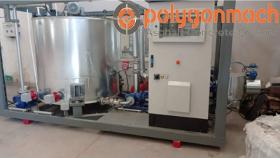
POLYGONMACH MAKINE SANAYI VE TICARET LTD STI
Turkey
Bitumen also known as asphalt is a petroleum derivative that is a black sticky and viscous liquid or semi-solid. It is mostly used to make asphalt concrete during road construction where it acts as a binder for aggregate particles. Because of its waterproofing and adhesive properties bitumen is an ideal material for constructing and maintaining roads roofs and other infrastructure. This substance is produced as a byproduct of distilling crude oil. Its strength and weather resistance make it the preferred material for paving roads and waterproofing buildings. Bitumen is used in a wide range of industries due to its many benefits which include resistance to temperature changes and long-term durability. Bitumen Emulsion To make bitumen emulsion bitumen water and extra additives are mixed together to maintain stability and performance.
Request for a quote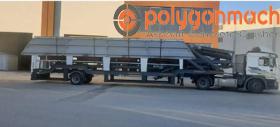
POLYGONMACH MAKINE SANAYI VE TICARET LTD STI
Turkey
A Mechanical Stabilization Plant: What Is It? In order to enhance the qualities of soil and make it more suitable for constructing infrastructure such as roads highways and airport runways the construction industry uses mechanical stabilization plants. In order to improve the strength durability and load-bearing capacity of the soil binding agents like lime cement or foamed bitumen are blended into the soil. The objective is to produce a uniform stable material that can back the building of long-lasting structures and surfaces. In situations where the native soil lacks the necessary qualities for construction mechanical stabilization plants are crucial. By modifying the properties of the soil these plants guarantee that the foundation is robust enough to support large loads and withstand environmental influences.
Request for a quote
POLYGONMACH MAKINE SANAYI VE TICARET LTD STI
Turkey
Types of Aphalt Plants With its unparalleled efficiency versatility and superior asphalt mix quality Polygonmachs 140-160 TPH mobile asphalt plant raises the bar for mobile asphalt production technology and is ideal for medium- to large-scale projects. With its cutting-edge features designed to meet the exacting specifications of asphalt production and its remarkable mobility this high-capacity plant is the ideal solution for projects requiring efficient high-quality asphalt production on the go.Aggregate Industries Asphalt Plants With an emphasis on quick deployment and simple operation for a prompt start of projects Polygonmachs 140–160 TPH mobile asphalt plant is painstakingly designed to offer a seamless user experience. Owing to its exceptional mobility it can be moved quickly and easily between locations.
Request for a quote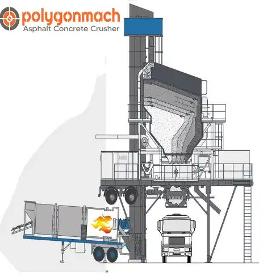
POLYGONMACH MAKINE SANAYI VE TICARET LTD STI
Turkey
Hot mix Asphalt Plant Types Hot mix asphalt plants can be configured in a variety of ways to suit the needs of different projects. The main varieties are portable mobile and stationary plants each has a special benefit depending on the size and specifications of the building projects it supports. Because of their steady setup and high production capacity stationary plants—which are fixed at a single location—are perfect for big long-term projects. On the other hand plants that are mobile or portable provide flexibility and mobility enabling them to be quickly moved to various job sites. This makes them appropriate for smaller more dynamic projects or those that need frequent site changes. This adaptability is best demonstrated by Polygonmachs mobile or portable hot mix asphalt plant. These plants are lightweight portable and quickly assemble they require little work to assemble disassemble and move.
Request for a quote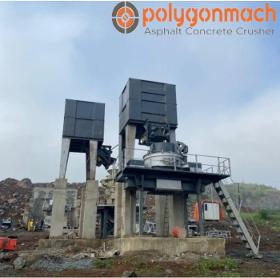
POLYGONMACH MAKINE SANAYI VE TICARET LTD STI
Turkey
Dolomyte, also called dolostone, is a sedimentary rock that contains large quantities of crushed Dolomyte mixed with small amounts of calcite and aragonite. It is thus typically formed in marine environments in which the presence of limestone has been chemically altered by magnesium-rich waters over geological time scales. As magnesium in the water reacts with calcium carbonate in the limestone some of the calcium in the limestone is replaced by magnesium. Rock formed in this manner is Dolomyte. Dolomyte rocks typically manifest in different colors, including white, grey, pink, or green, depending on the presence of impurities in the rock. Its compositions endows it with some unique properties, and for these reasons, it gets widely applied in multiple industries.
Request for a quote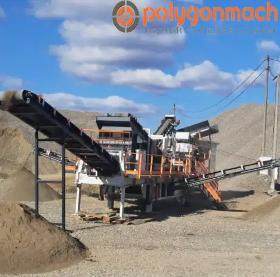
POLYGONMACH MAKINE SANAYI VE TICARET LTD STI
Turkey
What are the functions of mobile screening and crushing plants? For a variety of uses such as quarry mining and construction mobile crushing and screening plants are advanced machinery systems designed to crush and screen rocks minerals and other materials. These plants combine screening and crushing operations onto a single mobile platform providing great efficiency and flexibility. These plants are a popular option for many industrial operations because they save space and money by doing away with the need for separate crushing and screening units. Which Components Make Up Mobile Crushing and Screening Plants? 1. Feeder The feeder controls the flow of stones and minerals into the crushing equipment making it a crucial part of mobile crushing and screening plants. Feeders provide a constant and regulated material delivery avoiding jams and enabling a steady processing rate.
Request for a quote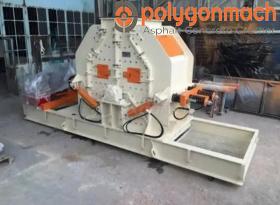
POLYGONMACH MAKINE SANAYI VE TICARET LTD STI
Turkey
The Horizontal Shaft Impactor (HSI) commonly referred to as a Tertiary Impact Crusher is a type of crushing equipment used to further reduce materials that have been processed through primary and secondary crushers into even finer particles. The last stage of crushed materials with exact particle sizes and shapes are usually produced by tertiary impact crushers. They work by applying high-speed impacts to break down the material using a horizontal shaft fitted with hammers or blow bars. A tertiary impact crushers main purpose is to refine the product to the appropriate size and shape in order to meet particular needs in a variety of applications including mining recycling and aggregate production. By producing finely crushed products appropriate for end-use applications tertiary impact crushers play a critical role in the last stage of material processing.
Request for a quote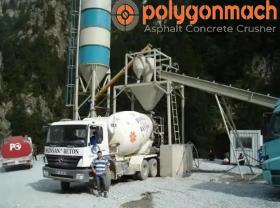
POLYGONMACH MAKINE SANAYI VE TICARET LTD STI
Turkey
A 30m3/hr dry type concrete batching plant is a compact and an effective means of concrete production that does not utilize water in the main mixing process. A 30 cubic metres per hour production plant of this type is intended to deliver moderate volumes of quality concrete mixes used for small to medium scale construction projects. Unlike the traditional wet mix plants, which use water throughout the mixing cycle, a dry type plant produces concrete by mixing dry components such as cement, aggregates, and admixtures in exact proportions. Water is introduced at the very end of the mixing, so the plant takes water in small quantities and offers a sustainable and green solution for concrete production as a whole, thus suitable for areas with little water available and tasks where water is crucial.
Request for a quote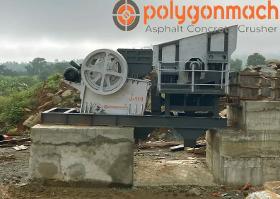
POLYGONMACH MAKINE SANAYI VE TICARET LTD STI
Turkey
A scalper screen is a very important device; industries like mining, construction, or aggregate processing use it to remove oversized or coarse materials from the feed before it reaches the primary crusher or any other processing equipment meant for the material. The major objective of the scalper screen is to pre-sort the material fed, to perfectly segregate the same by size, hence eliminating contaminants and debris that may otherwise cause interference in the trouble-free processing of the material in the successive stages. These are robust screens having large openings or bars that allow raking through the material, thereby sifting out only those correctly sized while keeping out oversized lumps or unwanted elements in the mix. By carrying out this process, Scalper Screens optimize performance and, in turn, reduce the risk of congestion, blockages, and excess wear and tear on in-line plant equipment that sits due west downstream
Request for a quote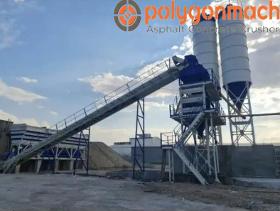
POLYGONMACH MAKINE SANAYI VE TICARET LTD STI
Turkey
An RCC (Roller Compacted Concrete) Batching Plant is an offshoot of regular concrete batching plants, which are used for making a large quantity of concrete within a short amount of time. In simple words, it's a specially designed plant for producing Roller Compacted Concrete, which is a very vital and cheap construction material used in many infrastructure projects. RCC Batching plants are equipped with machinery and equipment specially tailored to batching and mixing ingredients to be used in roller compacted concrete production. A batch plant is usually a combination storage bin or silo for cement, aggregates, and supplementary materials, such as fly ash or admixtures that are measured out with great precision and discharged into a mixing device for the addition of water and thorough mixing into a homogeneous concrete mix. RCC Batching Plants optimize mix design consistency and quality control to achieve the desired strength
Request for a quote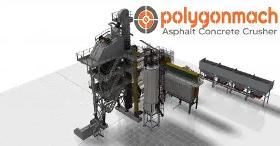
POLYGONMACH MAKINE SANAYI VE TICARET LTD STI
Turkey
Use Polygonmachs PBA 140-160 TPH Stationary Asphalt Plant to explore the world of productive asphalt production For large-scale construction projects Polygonmachs PBA 140-160 TPH Stationary Asphalt Plant is an innovative way to change the asphalt production process. Modern machinery like this one guarantees quality and efficiency in each batch of asphalt produced while adhering to the stringent specifications of contemporary building. This post will cover the general assembly procedure internal workings of the PBA 140-160 TPH Stationary Asphalt Plants and unique features that make it stand out from competing products. Which 140–160 TPH Stationary Asphalt Plant does PBA manufacture? This cutting-edge high-capacity PBA 140–160 TPH Stationary Asphalt Plant produces premium asphalt for large construction projects. This plants 140–160 tons per hour production capacity guarantees dependable and effective operation.
Request for a quote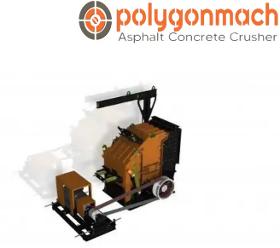
POLYGONMACH MAKINE SANAYI VE TICARET LTD STI
Turkey
A Secondary Impact Crusher is a type of crushing machine that typically comes in the form of a Horizontal Shaft Impactor (HSI). This crusher is designed to provide secondary or tertiary crushing capabilities by generating high-speed impact forces to further reduce the size of the material processed. In comparison to a Primary Impact Crusher, a Secondary Impact Crusher is usually aimed at producing smaller, finer particles and more refined end products. It operates by utilizing a rotating rotor equipped with impact tools such as hammers or blow bars that strike the incoming material, causing it to break apart through impact forces. Secondary Impact Crushers are commonly used after primary crushers in various industries such as mining, quarrying, and recycling to achieve a more refined product size or shape. These crushers excel at producing well-shape aggregates, finely crushed materials, and secondary applications requiring fine particle sizes.
Request for a quoteDo you sell or make similar products?
Sign up to europages and have your products listed
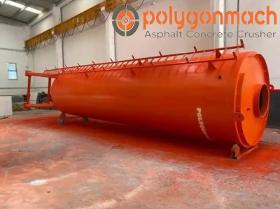
POLYGONMACH MAKINE SANAYI VE TICARET LTD STI
Turkey
A 120-ton Welded Type Cement Silo is a giant container in the shape of cylinder uprightness; it is used in holding cement basically in huge bulk quantities. These are developed out of very steel plates with the welded type, which gives the necessary robustness and strength with respect to the stored material weight on it. The welded design ensures that the silo is air and water-tight, preventing moisture and foreign materials from affecting the quality of the cement. Such silos are typically used in construction projects, where an uninterrupted and reliable supply of the material is to be maintained at all times. Large capacity of 120 tons eases bulk storage of huge quantities of cement at construction sites, eliminating multiple deliveries and hence sustaining an uninterrupted work process. Welded construction further eases their means of installation and maintenance; hence, the silos are best in their simplest and least costly form to meet cement storage needs.
Request for a quote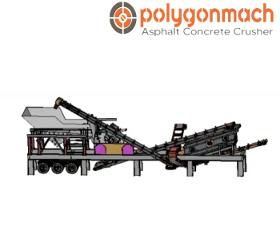
POLYGONMACH MAKINE SANAYI VE TICARET LTD STI
Turkey
A Mobile Limestone Calcier Crusher-PPI is a sort of special mobile crushing gear used for processing limestone, a sedimentary stones made mostly of calcium carbonate. It's a crusher that has the capacity of appropriately crushing and manipulating limestone right at the site, making it quite ideal for most applications that fall under construction, mining, and production of cement processes. Since this crusher is mobile, it can be moved to different sites, maximizing operational efficiency and providing flexibility in the processing of limestone to the targeted sizes and grades that are going to be used in any given project on the site without necessarily having to transport loads of materials to a processing site.Most often, the Mobile Limestone Calcier Crusher-PPI is paired with a primary crusher for course crushing and a secondary crusher for further processing of the crushed limestone.This equipment is essential in breaking the large limestone rocks into smaller sizes to meet consid
Request for a quote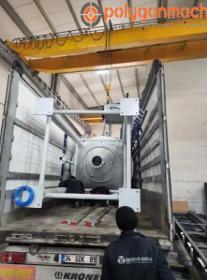
POLYGONMACH MAKINE SANAYI VE TICARET LTD STI
Turkey
A 60 tons welded type cement silo is a big storage container integrated to execute the specialty of maintaining and producing a large amount of bulk cement. Mainly, these are integrated at construction sites and concrete manufacturing plants to ensure the appropriate and continuous supply of cement in various types of building projects. Mostly made up of steel, welded, and cylindrically shaped with a bottom cone, the cement silos are strong and well-built to bear the weight and pressure exerted by the stored cement. These 60-ton welded-type cement silos are best used for cement storage in huge quantities, and at the same time, the controlled gauge pre-fabrication of cement is needed when producing concrete. This makes it possible to store huge amounts of cement—60 tons—which in turn lowers the frequency of refills and optimizes the logistics cost of cement transportation. Silos are welded on the structural integrity and to minimize insemination and contamination chances.
Request for a quote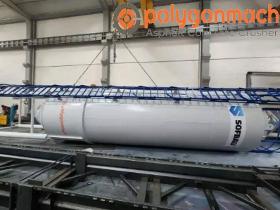
POLYGONMACH MAKINE SANAYI VE TICARET LTD STI
Turkey
A 100 tons Welded Type Cement Silo is a large vessel designed for storing cement in bulk. This silo type is fabricated from welded steel sheets that provide strength and durability to the vessel, allowing it to bear the weight of the stored material and act against the external environment. Its substantial storage capacity, reaching 100 tons, enables it to handle and distribute cement effectively in many industrial and construction environments. Operational, a 100 tons Welded Type Cement Silo receives cement through pneumatic conveying systems or another loading mechanism into the silo. The cement then settles down at the bottom of the silo, consuming the available storage. In applications that require cement for production or construction, the silo's discharge system, usually screw conveyors or airslide mechanisms, provides controlled withdrawal from the bottom. This will ensure a constant supply of cement while keeping famous issues like clogging or material bridging to a minimum.
Request for a quote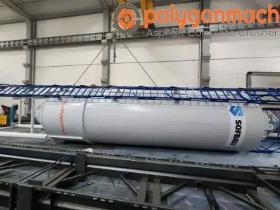
POLYGONMACH MAKINE SANAYI VE TICARET LTD STI
Turkey
The 50-ton welded type cement silo could potentially be a very large structure for concrete, cement. Those are usually applied and used at construct lines, concrete batch plants, and other industrial projects to store in addition to dispensing such objects. All-welded constancy in design guarantees their permanence and stability in long-term use with different ambient environments. The 50-ton capacity of the silo means the ability to provide a quantity that is possible to be on site well ahead of time to have the requirements of the construction met without delay. Even though the design is welded, the strength it gives is considerable enough for resisting harsh weather and, most importantly, ensures the cements stored therein are maintained safe and ready for fitting at desired times. To sum up, a 50-ton Welded Type Cement Silo- a ready and perfect solution for the storage of cement in required quantities for an ongoing construction project.
Request for a quote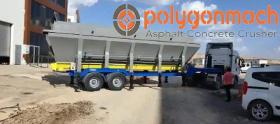
POLYGONMACH MAKINE SANAYI VE TICARET LTD STI
Turkey
A 100 tons horizontal type cement silo is a type of a structure constructed for holding a larger amount of cement in a horizontal way. These kinds of silos are used in construction work, concrete production plants, and a few other industrial applications that require storing large quantities of cement. The 100-ton capacity provides ample storage space for cement, ensuring that a constant and sufficient supply is maintained for construction. This silo has a horizontal layout, and within the small space it occupies, it serves its loading and offloading operation with a lot of ease. Considered to have such a big capacity, the Horizontal Type Cement Silo stands at 100 tons, since that is what the most silos available in the market are offering.
Request for a quote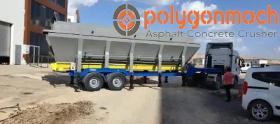
POLYGONMACH MAKINE SANAYI VE TICARET LTD STI
Turkey
A 60-ton Horizontal Type Cement Silo is a structure wherein a reasonably substantial amount of cement can be stored in a position that is horizontal with the help of the structure. It is very usual as silos in a majority of construction projects and concrete batching plants for efficient storage and transference of bulk cement. With the raised capacity of up to 60 tons, the cement storage of huge amounts is guaranteed as may be needed to meet the surging demand in various construction uses. Being horizontally structured, the 60-ton silo shares similar properties of easy mobility and installation and access in the construction sites to the top silos, and thus serves at enhancing the job site workflow and operational efficiency. The silos are usually fitted with a conveying system that allows the controlled discharge of cement according to the requirements of a construction.
Request for a quote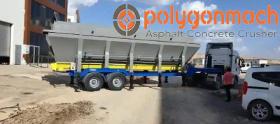
POLYGONMACH MAKINE SANAYI VE TICARET LTD STI
Turkey
A 40-ton Horizontal Type Cement Storage Silo is indeed a specially designed storage container that is used to contain up to 40 tons of bulk cement in horizontal orientation. Such silos find major applications in construction projects, concrete batching plants, and industrial establishments where a huge amount of cement is needed in order to produce concrete. 40-ton storage capacity supports the adequate storage of cement, providing a reliable and stable supply of cement for the mixing of concrete. Due to the horizontal silo design, loading and offloading of cement are carried out in a horizontal manner, ensuring level ground at all times. This allows for easy access for maintenance, refills, and withdrawal. These types of silos are basically built in very strong materials, such as steel, to hold bulk cement properly and save it from external agents.
Request for a quote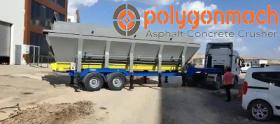
POLYGONMACH MAKINE SANAYI VE TICARET LTD STI
Turkey
A 30 tons Horizontal Type Cement Silo is a specially designed container able to contain as much as 30 tons of bulk cement in horizontal configuration. These are mainly used in construction projects, concrete batching plants, and other industrial works requiring large volumes of cement for the preparation of concrete. This horizontally designed silo enables cement loading and offloading at ground level to be simple, making it easily accessible for maintenance, refilling, and dispensing. Customarily made from robust materials like steel, these silos ensure the safe storage of cement and an environment in which its quality and integrity can be assured, while remaining readily accessible when needed for concrete mixing. The 30-ton capacity for a Horizontal Type Cement Silo only means the ability to hold large quantities of cement, most effective for mid- or big-sized civil construction projects that require a huge volume of the material.
Request for a quote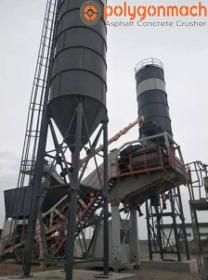
POLYGONMACH MAKINE SANAYI VE TICARET LTD STI
Turkey
A 5000-ton bolted-type cement silo is a specially designed storage structure to contain 5000 tons of bulk cement or other powdered materials used in construction and industrial processes. These silos are necessities in concrete batching plants, construction sites, and industrial facilities where huge volumes of cement shall be stored safely and made readily available for use in production processes. Made of strong materials like steel, a cement silo of 5000 tons capacity has a strong cylindrical body and a support structure that needs to be resilient enough to be able to bear the weight of the material being stored. One bolted type cement silo of 5000 tons of massive storage capacity enables storing a large quantity of cement at one site, therefore feeding ongoing concrete production or construction or manufacturing operations, very much efficiently on a large scale. In the view of strength and great storage capacity
Request for a quote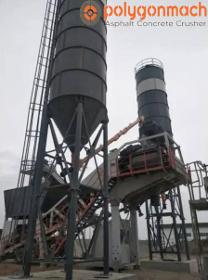
POLYGONMACH MAKINE SANAYI VE TICARET LTD STI
Turkey
The 1000-tone Bolted Type Cement Silo is a specially designed storage specially designed storage container for holding bulk cement or other powdered materials, 1000 tons, normally used in construction and industrial applications. These silos form one of the main units of a concrete batching plant, construction site, and manufacturing facility where such large amounts of cement must be stored safely and made readily available for immediate production processing. Produced from strong materials, such as steel, the 1000-ton cement silo offers safe and efficient storage that ensures the quality and nature of the retained materials are preserved. A 1000-ton silo facilitates the storage of a large quantity of cement on-site so as to effectively support continuous production of concrete, construction works, or manufacturing. This large capacity allows the systems to cater for heavy production in big projects and large industrial set-ups.
Request for a quote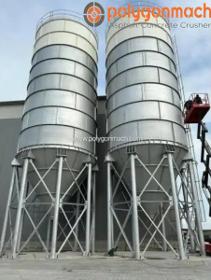
POLYGONMACH MAKINE SANAYI VE TICARET LTD STI
Turkey
A 2500-ton bolted-type cement silo is a specifically designed warehouse unit for storage of up to 2500 tons of bulk cement or other powdered materials used for construction purposes and even industrial setups. These kinds of silos become of utmost importance because they store large volumes of cement safely, hence making sure there is a constant and reliable supply for use in all applications that cannot be calculated. Normally made with tough materials like steel, a 2500-ton cement silo would simply be a heavy cylinder, and underneath that shape, a whole structure is suspended to carry the weight of material stored inside. A silo of 2500 tons' capacity is therefore quite ideal for such large-scale undertakings that require constant iterations of quality concrete to keep the construction processes ongoing and for those industrial processes that demand substantial, relentless volumes of seemly concrete use.
Request for a quoteResults for
Limes - Import exportNumber of results
136 ProductsCompany type


